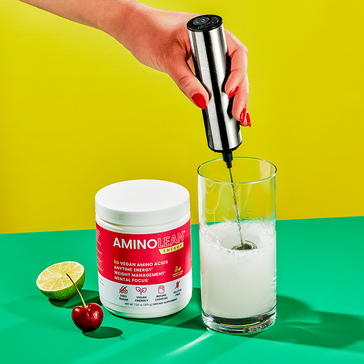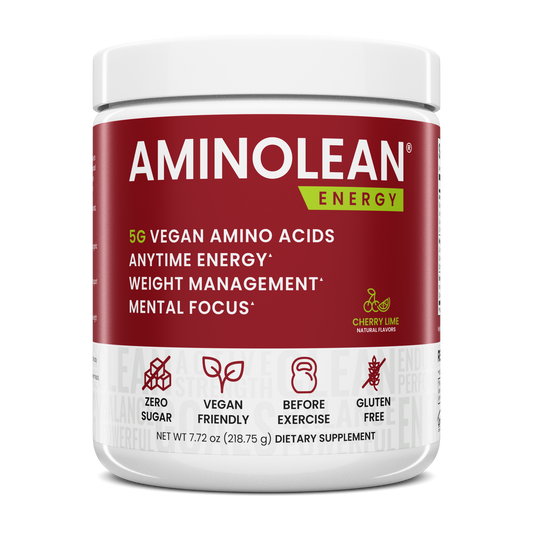When it comes to reaching our body composition and weight loss goals, many of us have been told that our metabolism holds the code we need to crack for success. But what exactly is the metabolism—and is it as complicated and (un)changeable as it seems? Is metabolism genetic? Keep reading to find out.
What Is Your Metabolism Exactly?
Let’s start with a definition. “Your metabolism is the process your body uses to burn calories and/or fat for energy to survive and live life,” explains Dr. Allen Conrad, BS, DC, CSCS of Montgomery County Chiropractic Center in Pennsylvania. Said another way: your metabolism is how you turn food into fuel.
Likely, you’ve heard someone credit their skinny frame to a fast metabolism, or stalled weight loss to a slow one. What they’re referencing is their metabolic rate, which is how many calories the body burns or uses per day, Conrad explains.
Unfortunately, there’s a lot of misinformation out there about what determines your metabolic speed, or rate. With the help of experts we round up (and bust!) the most pervasive metabolism myths.
Myth #1: It's 100% Determined From Genetics
“While it's true that genetics help determine our metabolic rates, we do have some control over our metabolism,” says registered dietitian Maggie Michalczyk, R.D.N, founder of Once Upon A Pumpkin. Exciting!
“The biggest way we can influence how many calories we burn and how well we manage our weight is through physical activity,” she says. However not all exercise affects our metabolism equally. More on that below.
Myth #2: Cardio Is The Best Workout For Our Metabolism
Logging miles on the treadmill may increase calorie burn and improve heart-health, but running doesn’t necessarily result in a faster metabolism. What gives? “Increasing muscle mass is the best way to increase your metabolism,” says sports dietitian Marley Oldham Carnes MS, RDN, CSCS, CPT. “This is best accomplished by adding strength training to your workout routine—and eating enough protein in your diet to support muscle growth,” she says, not by lacing up.
In fact, one 2015 study published in the journal Medicine & Science in Sports & Exercise, which compared resistance training to traditional cardio exercises points to this. The researchers found that after 12 months, folks who performed strength moves at least once a week reported increased muscle and reducing fat, while those who only did cardio only saw reduced fat.
Carnes makes another important point: if you’re doing copious amounts of cardio and not properly fueling before/after, you could actually slow your metabolism. “If you burn more calories than you consume and are not working to build muscle tissue, can start to lose muscle mass, causing a decrease in your metabolic rate,” she explains.
The recommendation: strength train a minimum of 2 to 3 non-consecutive days per week.
Myth #3: Skipping Breakfast Slows Your Metabolism
“Skipping breakfast has no measurable effect on the metabolism,” says Dr. Conrad.
He points to a 2017 study published in The Journal of Physiology which compared the metabolisms of morning-fasters, compared to the metabolisms of breakfast-eaters after six weeks. The results? Both groups metabolic rate was about the same.
While one skipped bowl of oatmeal won’t shut down your metabolism, Carnes does recommend eating breakfast—especially for folks trying to lose weight or live an overall healthier lifestyle. “In my experience, it can help folks make healthier eating choices throughout the day,” she says.
Michalczyk agrees, adding that eating a nutrient-dense breakfast can keep folks full-enough until lunch, to prevent mid-day overeating
Myth #4: Coffee Keeps Your Metabolism Cruising
While we’re on the topic of breakfast...go ahead and pour yourself a cup of joe. Research has found that drinking coffee (and other caffeinated beverages) might result in a slight metabolic boost.
That said, according to Carnes, “if you already have a coffee drinking habit, the chance that it is providing any metabolic increase or benefits associated with caffeine is probably quite slim,” she says. And because excess caffeine intake has been linked to worsened cardiovascular health and increased sleep disturbances, she says moderation is key.
So, coffee could give it a slight boost, but it’s no cure-all.
Myth #5: Eating Many Small Meals Will Speed Up Your Metabolism
If you enjoy grazing throughout the day, go forth! Just don’t think eating many small meals throughout the day is going to affect your metabolism. Michalczyk explains: Whenever we eat food, our body has to burn calories in order to break the food down and absorb the nutrients. This creates a slight boost in our metabolism,” she says.
However, research shows that temporary boost in our metabolic rates is directly proportional to how much and what types of foods we eat. “So those six small meals slightly increase your metabolism six times over the course of the day, but three larger meals would provide three proportionally larger boosts,” she says. That means the same amount of calories have been burned at the end of the day.
Myth #6: Big Meals Are Your Metabolism Nightmare
Yes, eating big, calorie-dense meals with every single meal can lead to increased fat storage and reduced metabolism. But Carnes assures that eating one big meal is not going to squander to metabolism. Again, “overall daily calorie intake impacts your metabolism not the amount or frequency of meals/snacks eaten.”
More important than thinking about the number of meals per day, says Carnes, is the amount of protein you’re getting throughout the day. “Protein can help stimulate protein synthesis, which with the addition of strength training can increase your muscle mass and therefore impact your metabolic rate,” she says. To find out how much protein you need to eat per day, divide your weight by 2.2 to get kilograms. Then multiply that number by 1.2 and 1.7 for a range of recommended protein for muscle growth.
Myth #7: Spicy Foods Stoke Your Metabolism
They may imbue your meal with serious flavor and send sensitive folks sprinting for tastebud-soothing milk. But what spices and spicy peppers can’t do: spike your metabolism. “There’s a compound called capsaicin that researchers have shown may result in a slight metabolic boost,” explains Michalczyk. “While the compound is present in certain spicy foods like red peppers, not enough is present to dramatically change your daily calorie burn or help you lose weight.”
Her suggestion: Add the fiery food to your red sauce and salsas, but only because you like a dish with a kick—not because you think it’ll cook your metabolism.









